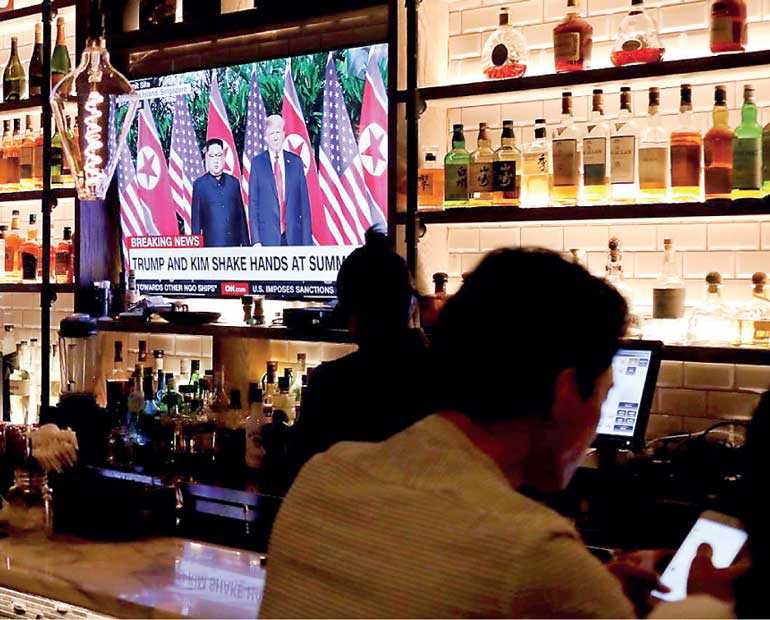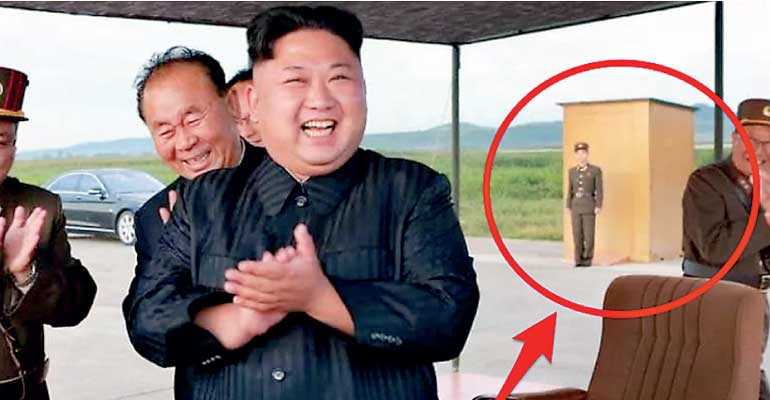Tuesday Feb 24, 2026
Tuesday Feb 24, 2026
Friday, 15 June 2018 00:00 - - {{hitsCtrl.values.hits}}

A television screen at the Baro bar broadcasts the Singapore summit meeting between U.S. President Donald Trump and North Korean leader Kim Jong Un, as customers sit at the bar in the Korea Town section of Manhattan, New York, U.S., June 11, 2018 - REUTERS
WASHINGTON/NEW YORK (Reuters): Just over half of all Americans say they approve of how President Donald Trump has handled North Korea, but only a quarter think that his summit this week with Kim Jong Un will lead to the denuclearisation of the Korean peninsula, according to a Reuters/Ipsos opinion poll released on Wednesday.
In a joint declaration following their meeting in Singapore on Tuesday, the North Korean leader pledged to move towards complete denuclearisation of the peninsula and Trump vowed to guarantee the security of the United States’ old foe. 40% of those polled said they did not believe the countries would stick to their commitments.
Another 26% said they believed the United States and North Korea would meet their commitments, while 34% said they did not know whether they would follow through.
39% believe the summit has lowered the threat of nuclear war between the United States and nuclear-armed North Korea, slightly more than the 37% who said they did not believe it changed anything. Trump has pursued what he calls a “maximum pressure” campaign” against Pyongyang to force it to give up its nuclear weapons. He toughened up international sanctions to further isolate North Korea and then agreed to meet directly with Kim after South Korea’s president convinced him that the North was committed to giving up its nuclear weapons.
The Reuters/Ipsos poll suggests the Republican president has broad support for one of his biggest foreign policy efforts, despite criticism from non-proliferation experts that Trump had exacted few concrete commitments from Kim on Tuesday on dismantling his nuclear arsenal.
Republicans appear much more enthusiastic than Democrats about the potential benefits of the summit. The poll found that Republicans were twice as likely as Democrats to say that the meeting lowered the threat of nuclear war, and they were three times as likely to say that both sides would follow through on their commitments.
Democrats typically give Trump low approval ratings – only 12% approve of his overall job performance. But about 30% said they approved of his handling of North Korea. Trump, who returned to Washington early on Wednesday, hailed the meeting with Kim, the first between a sitting US president and a North Korean leader, as a success that had removed the North Korean nuclear threat. Their seemingly friendly meeting was in sharp contrast to their tit-for-tat insults and bellicose rhetoric late last year while Pyongyang carried out its biggest nuclear and missile tests.
In the poll, Trump received a 51% approval rating for his handling of North Korea and also led the list of leaders who should take the most credit for the summit and the joint pledge. Forty% say the former real estate developer should take the most credit, followed by South Korean President Moon Jae-in with 11%. Kim was third with 7%.
Trump has repeatedly touted his role in bringing the reclusive North Korea to the negotiating table, a feat that he says his predecessors were unable to pull off.
It may be too soon though to know whether Trump’s diplomatic breakthrough will help Republican candidates in congressional elections in November, when Democrats will attempt to retake control of both houses. Typically foreign policy is not a major concern for mid-term voters.
“It’s too early to say if there is a net positive out of that,” said Republican strategist Alice Stewart. “It’s a good step to have the conversation but that doesn’t yet mean that it’s a success.”
Ron Bonjean, also a Republican strategist, said voters were more likely to be influenced if there was serious and measurable progress closer to the election.
The Reuters/Ipsos opinion poll was conducted online in English, between June 12-13 in the United States. It gathered responses from more than 1,000 adults, including more than 400 Democrats and 400 Republicans.
It has a credibility interval, a measure of the poll’s precision, of 4%age points for the full sample and 6 percentage points for the Democrats and Republicans, meaning that the results could vary in either direction by that amount.
Kim Jong Un travels with a personal toilet. What secrets does it hold?

North Korean leader Kim Jong Un watches a ballistic missile test while, in the background, a soldier guards Kim's personal john - AFP
Livescience.com: Some of us carry a security blanket to feel more comfortable when we are far away from home. North Korean leader Kim Jong Un reportedly carries a security toilet.
According to the South Korean newspaper Chosun Ilbo, Kim arrived in Singapore for a nuclear disarmament summit with US President Donald Trump, and he brought his personal toilet with him.
Indeed, it is said that Kim never leaves home without a personal lavatory, and actually travels with several toilets every time he’s on the road, the South Korean news site Daily NK previously reported. The leader’s amenities include an emergency “chamber pot” in his Mercedes, that report said, as well as a designated toilet car in his motorcade. A separate mobile commode designed to handle “mountainous terrain and snow” may also join the leader’s caravan as needed, according to an unnamed source privy to the leader’s privy, Daily NK reported.
While anyone who has ever taken a road trip can understand the appeal of entirely avoiding public restrooms, Kim’s mobile throne is also said to serve a national security purpose. Lee Yun-keol, a former member of a North Korean Guard Command unit, told The Washington Post that “the leader’s excretions contain information about his health status so they can’t be left behind.” As Chosun Ilbo put it, the mobile lavatories “deny determined sewer divers insights into the supreme leader’s stools.”
“The digestive tract contains more bacterial cells than there are cells in the entire body,” Dr. Jean-Pierre Raufman, a gastroenterologist at the University of Maryland School of Medicine, previously told Live Science.
Not only is this dense bacterial biome like a fingerprint that contains the pooper’s unique DNA, but it can also reveal whether that person’s bowels are absorbing the nutrients they need and rejecting the germs they don’t.
According to Raufman, the shade of Kim’s stool could indicate, for example, whether the leader is bleeding internally or taking medication to treat an iron deficiency. Overly narrow stools could indicate a blockage in Kim’s colon, which could be a sign of intestinal cancer. A poor diet or reliance on certain medications could result in constipation — which, if untreated, could lead to hemorrhoids or rectal bleeding. Persistent diarrhea, on the other hand, could be a sign of chronic disease such as irritable bowel syndrome or Crohn’s disease.
Kim, who often relies on images of strength and power to bolster his leadership, would likely sooner keep his health status — and his poos — to himself (and his medical team). On this, at least, we can’t say we blame him.